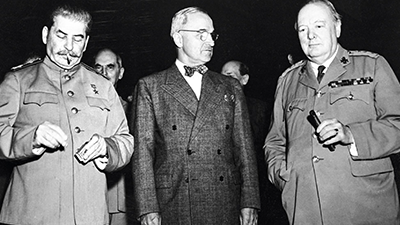Cold War and Decolonization
Teacher Resources
Driving Question: What were the linkages between the Cold War and decolonization?
As the Second World War ended, new global conflicts emerged. The Cold War and decolonization were entangled in a complex web of economics, conflict, diplomacy, and espionage. In this lesson you’ll step into a world divided by ideology and energized by revolution.
Learning Objectives:
- Use evidence to evaluate how the Cold War and decolonization are intertwined in the history of this period.
- Evaluate what changed and what stayed the same from the era of global conflict to the Cold War and decolonization.
Vocab Terms:
- apartheid
- decolonization
- empire
- ideological
- protest
- superpower
- union
Opener: Cold War and Decolonization
To teach this lesson step, refer to page 2 of the Lesson 8.1 Teaching Guide.
Review the OER Project Teaching Sensitive Topics in Social Studies Guide as you work through sensitive subject matter with your students.
As you get ready to learn about the Cold War, consider what you think you know and what you know you don’t know.
Looking Ahead
To teach this lesson step, refer to page 3 of the Lesson 8.1 Teaching Guide.
For reading strategies, take a look at the OER Project Reading Overview.
Agree or disagree? Evaluate some statements before you dive into Unit 8—then see how accurate you were when you get to the end of the unit.
New Global Conflicts
To teach this lesson step, refer to page 4 of the Lesson 8.1 Teaching Guide.
Looking for some visual reminders of the frames for your students? These Frames Posters are great to post in your classroom!
After the Second World War, global empires crumbled and new tensions rose. Learn how independence movements, superpower rivalries, and shifting alliances created a new and often unstable global landscape.
-
Guiding Questions
-
Before you read
Preview the questions below, and then skim the article. Be sure to look at the section headings and any images.
While you read
Look for answers to these questions:
- How did the Second World War shift the focus of the global story you’ve learned so far?
- Why were some conflicts, such as the Cold War struggles and decolonization, for example, described in different ways, depending on one’s perspective?
- How was the Cold War an ideological struggle?
- What lasting changes came from decolonization and independence movements?
After you read
Respond to this question: Which do you think had a greater impact on the modern world—Cold War struggles or decolonization movements? Use evidence to support your answer.
-
Guiding Questions
-
Before you watch
Preview the questions below, and then review the transcript.
While you watch
Look for answers to these questions:
- Why did a struggle between the Soviet Union and the United States emerge in the years following the end of the Second World War?
- What was one way in which decolonization was a result of the Second World War?
- How did the Cold War and decolonization become tied together?
- How are the spikes in the US military budget in the 1950s, mid-1960s, and 1980s evidence of the global reach of the Cold War?
- Why did Cuban troops get involved in decolonization in Angola? How did this involvement lead to their participation in the battle of Cuito Cuanavale?
After you watch
Respond to this question: Why do you think the world failed to find lasting global peace after World War II?
Cold War Frames
To teach this lesson step, refer to page 5 of the Lesson 8.1 Teaching Guide.
Closers are a great way to assess student learning and progress. Learn more in the OER Project Assessment Guide.
The Cold War and decolonization were massive, complex conflicts. Here, you’ll practice using the frames of communities, networks, and production and distribution to make sense of how they unfolded and connected to each other.
-
Guiding Questions
-
Before you watch
Preview the questions below, and then review the transcript.
While you watch
Look for answers to these questions:
- What were the systems of production and distribution championed by the United States and the Soviet Union, respectively?
- What is a shared trait of capitalism and communism and how did it draw the United States and the Soviet Union into decolonization conflicts?
- How can we view decolonization through the lens of the communities frame?
- How did the Cold War and decolonization together give rise to networks of leaders, rebels, and states?
After you watch
Respond to the following question: How does looking through the three frames help you understand the ways that the Cold War and decolonization were connected?
Closer: Cold War and Decolonization
To teach this lesson step, refer to page 5 of the Lesson 8.1 Teaching Guide.
You’ve reached the end of this lesson, comrade! Use the propaganda in this activity to review what you’ve learned.
Poster Preview Slideshow
Writing: Peer Editing
To teach this lesson step, refer to page 5 of the Lesson 8.1 Teaching Guide.
Being able to provide clear and supportive writing feedback to a classmate isn’t just helpful to them—it will also help you develop your own understanding of strong writing.

















